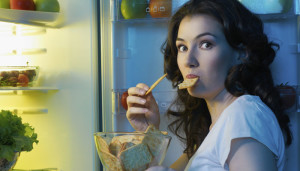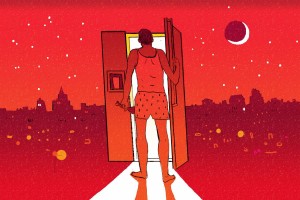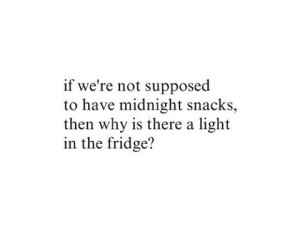When I was growing up, my mother always told me to never eat something an hour or less before I went to sleep, because she always said it was bad for your health. So, I grew up following this path and rarely ate any midnight snacks, (only on a few sleepover occasions.) However, once I got to Penn State as a freshman that started to change. As a freshman here, I’m new to the super late hours, little sleep and late night studying, so naturally I’ve been snacking while studying late at night. I’ve always heard of the “Freshman 15” and I’ve always wondered why it happens…could eating late at night before sleeping be the cause? Does eating right before sleeping lead to gaining weight?
Late night snack = future heart attack?
According to According to a Washington Post article, scientists have been working on whether or not the time of day that humans consume foods is related to negative health impacts, or if “night time calories” are the same as the ones eaten earlier for lunch. In the article it states that “Studies tend to show that when food is consumed late at night — anywhere from after dinner to outside a person’s typical sleep/wake cycle — the body is more likely to store those calories as fat and gain weight rather than burn it as energy,” according to their source, Kelly Allison of the University of Pennsylvania School of Medicine’s Center for Weight and Eating Disorders.
This study has been trying to prove itself true through animal tests. The Washington Post writer Van Allen continues by commenting that some animal studies have shown significance in the idea that foods are processed differently at different times of the day. The differences could be “due to fluctuations in body temperature, biochemical reactions, hormone levels, physical activity and absorption and digestion of food,” to name a few. Studies used in this article have a main point that “when the participants ate late, they couldn’t metabolize, or burn off, carbohydrates as well as when they ate earlier. They also had decreased glucose tolerance, which can lead to diabetes.” (Washington Post) The major health issues like obesity, high blood pressure, presented make all of us question how serious of an issue late night snacking really could be.
The same source argues that even more serious health problems could potentially rise from eating bad snacks late at night. According to the Washington Post, two considerably significant studies have been done recently: one which tracked the weight loss/gain of 420 obese people and one that studied a small number of healthy women.
To highlight the obesity study, I looked further into what they had discovered. From their experiments that studied the 420 humans, their takeaways are below.
Late lunch eaters lost less weight and displayed a slower weight-loss rate during the 20 weeks of treatment than early-eaters (P=0.002). Surprisingly, energy intake, dietary composition, estimated energy expenditure, appetite hormones and sleep duration was similar between both groups. Nevertheless, late-eaters were more evening-types, had less energetic breakfasts, and skipped breakfast more frequently that early-eaters (P<0.05). CLOCK rs4580704 SNP associated with the timing of the main meal (P=0.015) with a higher frequency of minor allele (C) carriers among the late-eaters (P=0.041).
From their findings, the scientists concluded multiple things. In the experiment, other variables like amount of sleep, energy intake and weight of the participants was kept relatively similar or the same. The main issue discovered with their study is that the timing of eating could lead to serious problems. For example, those who are snacks later at night were eating less or late breakfasts, and potentially eating unhealthier foods than those who ate earlier and were able to work off the food throughout the day. Their main conclusion lies at this: “This is the first prospective longitudinal study to show that timing of food intake relates with weigh loss effectiveness in humans. In 420 overweight/obese patients undergoing a 20-week weight-loss diet, those who ate their main meal late lost significantly less weight than early eaters.” Which to me, seems like pretty conclusive evidence.
 Body Weight and Weeks of Treatment
Body Weight and Weeks of Treatment
Once you midnight snack, you can never go back
Despite relevant results, scientists from the study are still looking into what other factors may cause the issues with the weight loss, such as “satiety hormones, such as leptin or ghrelin,” genetics playing a role, and even sleep patterns for each individual. So technically “the mechanisms linking meal timing and weight loss” is still “unknown.”
Yet however, because it is one of the first studies of it’s kind on this topic, there is of course difficulty in drawing direct conclusions from the data presented. This of course, causes others to poke and pry at accepting that late snacks can be bad for our health.
According to TIME Magazine, skeptics of the correlation of late night snacks and health difficulties / losing weight argue that snacks at night may not be the worst thing in the world, as long as those snacks aren’t a gallon of ice cream or three greasy hamburgers.
TIME’s article argues that we’ve “been told eating before bed is a no-no. But a little pre-slumber snack can help you sleep more soundly without packing on pounds-if you reach for the right foods.” I believe that the key words here are “the right foods.” What is the line between good foods to snack on and bad ones? And does that vary by person?
TIME supports their argument by using evidence from dietician’s that have opposing viewpoints from the previous study above. “If you tend to eat dinner a few hours before bedtime or you’re very active (or both), snacking before bed will help stabilize your blood sugar levels during the long, meal-less night,” according Stephanie Maxson, senior clinical dietician at the University of Texas’s MD Anderson Cancer Center that TIME using for their input on the issue.
As one can tell, no clear lines have been drawn yet to indicate what really happens if you snack late at night. The varying possibilities could be endless: what your gender is, how old you are, previous illnesses, the type of food being eaten, a person’s sleep cycle, etc. For now, it seems that studies can only begin to prove that there is some type of correlation between the two matters.
Better safe (snacking) than sorry
So, as college students, even though the correlation=causation is still up in the air, maybe we should think twice about what we eat right before we sleep. Who knows, it could potentially help prevent that Freshman 15 (and gaining weight in any other year.) Instead of reaching for a cookie or candy before bed, if you do need a snack, I would argue that “better safe than sorry” is a good route, by eating some fruit or drinking water, because, let’s face it, a midnight snack is almost impossible to resist. But maybe, just maybe, my mom (and i’m sure your moms’ as well) do know a thing or two about that infamous midnight snacking.
***All of the studies and facts presented in this blog are not mine and have been cited to their sources appropriately. The information belongs to their authors and the pictures have also been cited***




This is something my mom has always stressed since I was little. My sister became a fitness fanatic and a personal trainer about a year or two ago and I’ve learned a lot about eating habits through her. She always tells me to eat the biggest meals earlier in the day so that your digestive system can properly digest it all. Eating big meals or unhealthy snacks causes fat build up and other negative health conditions. Most dietitians will give you a snack hours before you sleep so that you’re not super hungry yet giving your time to digest the snack. The snack is generally light and healthy to not effect your body. This article tells you what snacks are good to eat before bed and which are not:
http://www.health.com/health/gallery/0,,20628881,00.html
I have also wondered about late night snacking. Though, I have never heard the “don’t eat within the hour before your go to bed” rule. My mother always had us eat before 8pm because, like you said, the later you eat, the less active you are. Then, the food doesn’t digest, it is just turned into fat. I too, try to limit my late night snacking because with my hectic schedule , I don’t know when I’m going to be able to make it to the gym. I always wondered how the freshman 15 happened, but I can see now thats it for all those late nights when you can’t help, but eat the snacks that you are conveniently surrounded by. I even read some where that late night snacking can lead to tooth decay! However, if you want, you can read more about that here.
http://healthyeating.sfgate.com/bad-effects-snacking-3832.html